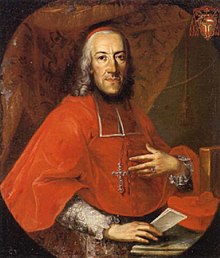Andreas Jakob von Dietrichstein
Andreas Jakob Graf von Dietrichstein (born May 27, 1689 in Iglau ( Moravia ); † January 5, 1753 in Salzburg ) was the successor to Prince Archbishop Count Liechtenstein and ruled Salzburg from 1747 to 1753, i.e. shortly before the birth of Wolfgang Amadeus Mozart .
family
Andreas Jakob Graf von Dietrichstein came from the Nikolsburg (Moravian) line of the Dietrichstein family , whose origins can be traced back to Carinthia . His father was Maximilian Andreas (1638–1692) Count von Dietrichstein, his mother Maria Justina (1647–1696), daughter of Edmund (Edmond) III. Count of Schwarzenberg Seigneur de Bierset.
Life
Andreas Jakob studied from 1707 in Salzburg, where he 1713 voting canon , 1729 dean and 1730 dean was.
On September 10, 1747 he was elected Archbishop of Salzburg. He was probably a compromise candidate for the canons, but the people of Salzburg clearly wanted a Prince from Salzburg, namely Dietrichstein. He was ordained bishop on June 1, 1749, by Josef Maria Reichsgraf von Thun and Hohenstein , then Bishop of Gurk .
According to an inscription ( photo ) on the monument to Andreas Jakob von Dietrichstein in Salzburg Cathedral , he was the first Salzburg archbishop to be formally awarded the title Primate Germaniae from the Roman-German Emperor.
Andreas Jakob was a dignified archbishop who, in contrast to his predecessor, was popular with the people, with a simple and gaunt appearance. He was a good connoisseur of Salzburg's conditions, an eager and deliberately hard-working person, but also a friend of the festivals, the masked balls and the theater.
Andreas Jakob Graf von Dietrichstein also suffered from the great financial difficulties of the archbishopric, which had been aggravated by the previous eviction of Protestants . So he demonstratively denied the cost of his episcopal ordination from his own resources. He was able to lower the amount of the levy required by the Pope for his episcopal ordination and also achieved that this was paid by Maria Theresa .
In view of the financial hardship, on the one hand he campaigned for particular thrift at the court and in administration, combined with restrictions on dress codes, for example, and the renunciation of the construction of new large buildings, on the other hand he tried his best to promote the country's economy.
The trick fountains in Hellbrunn were also poorly repaired. Only the “smith's grotto” was prepared. However, the "Mechanical Theater" of the Hellbrunn Fountains was rebuilt. Lorenz Rosenegger committed himself for 343 guilders to create 100 new figures and to get the work going, which succeeded with a number of difficulties and a significant increase in costs. Dietrichstein also renovated the dilapidated St. Andrew's Church in Linzer Gasse .
Dietrichstein's motto was "amore et justitia" - "Through love and justice" - a principle to which he remained lifelong as a just prince and friend of the people.
Dietrichstein died on January 5, 1753. Despite all the stressed thrift, Dietrichstein still left his successor with high debts.
Archbishop Dietrichstein was buried in the crypt of Salzburg Cathedral.
Web links
- Entry on Andreas Jakob von Dietrichstein on catholic-hierarchy.org ; accessed on November 21, 2017.
Individual evidence
- ↑ Actapublica - Matriky - Moravský Zemský archive Brno. Retrieved November 7, 2019 .
- ↑ Death book - STBIV | Salzburg Cathedral Parish | Salzburg, rk. Diocese | Austria | Matricula Online. Retrieved November 7, 2019 .
| predecessor | Office | successor |
|---|---|---|
| Jakob Ernest of Liechtenstein |
Archbishop of Salzburg 1747–1753 |
Sigismund von Schrattenbach |
| personal data | |
|---|---|
| SURNAME | Dietrichstein, Andreas Jakob from |
| ALTERNATIVE NAMES | Dietrichstein, Andreas Jakob Graf von (full name) |
| BRIEF DESCRIPTION | Archbishop of Salzburg |
| DATE OF BIRTH | May 27, 1689 |
| PLACE OF BIRTH | Moravia |
| DATE OF DEATH | January 5, 1753 |
| Place of death | Salzburg |





